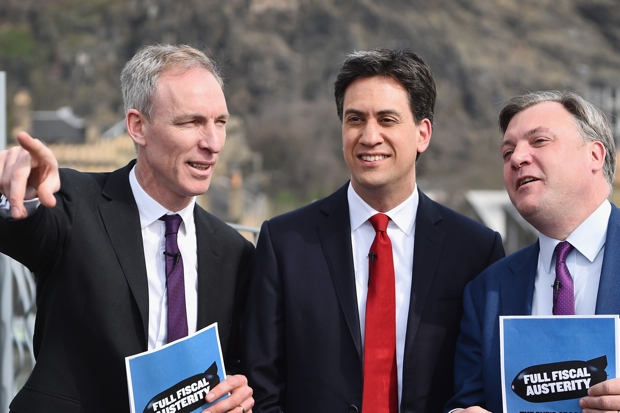This is a bastard election full of bastard choices. In such circumstances some triage is required. Once everything that is impossible has been eliminated what remains must, for tomorrow at least, be the truth.
Which is why, as I wrote in today’s Times, I shall be voting Labour.
For the first time. Ever.
It is not a vote cast lightly or with much confidence. But though my constituency, Edinburgh North and Leith, has an admirable Tory candidate the sorry truth is that he cannot win tomorrow. This being the case, it is not illogical to vote for the least bad candidate who might have a chance of prevailing. In this instance, that is the Labour candidate.
It will probably not be enough. It seems likely that the SNP will win this seat just as they are likely to win the great majority of Scottish constituencies tomorrow. Which means, I think, it is incumbent upon those of us who do not want the SNP to win the great majority of Scottish constituencies to do whatever little we can to prevent that happening.
I doubt that tactical voting will be enough save in perhaps a handful of seats to make an impact and, in truth, I’m not sure my constituency is one of those seats. Nevertheless, the effort should be made.
If I still lived in god’s own country I’d cheerfully vote for John Lamont in Berwickshire, Roxburgh and Selkirk. He would be a fine MP and a worthy successor to poor, decent, doomed Michael Moore. But I don’t live there any longer.
There is nothing reprehensible about voting for the least bad option. The nature of the first past the post system justifies such an approach. And it does so, most especially, when the outcome of an election actually matters.
This election, more than most, matters.
As in the referendum – and I’ll have more to say on this in the print edition of the magazine out tomorrow (subscribe, you swabs!) – every vote in Scotland actually counts tomorrow. Or almost every vote, in almost every constituency. This is so unusual a set of circumstances that it should concentrate minds.
Just as the iron logic of constitutional politics propels Yes voters to endorse SNP candidates, often for the first time, so it nudges No voters to support whichever candidate representing whichever Unionist party is best placed to shove their little finger in the dyke in an attempt, however doomed or desperate, to prevent the nationalists from breaking through. If one voting shift is logical and sensible so is the other.
It doesn’t mean that one thirsts for Prime Minister Miliband. We can only do what we can where we vote. But if there is to be a Labour government and that government is going to rely upon some measure of tacit SNP support it still seems better that it should rely upon as little of that support as possible. Better for Scotland, that is, but also better for England. And by better I mean, of course, not quite as disastrous.
It is true that more Labour MPs in Scotland makes David Cameron’s prospects of holding on to power less likely even if replacing Labour MPs with SNP members does not increase the number of MPs prepared to support a Tory-led government. But so be it. The more MPs Labour have the less “illegitimate” any Labour-led ministry will be. (It would, of course, be perfectly legitimate regardless of that, just as Cameron’s attempts to cobble together a government if he leads the largest party will be equally legitimate.)
The SNP will, in their usual tiresome fashion, claim to speak for Scotland regardless of the result. But they will do so more credibly if they have more than 50 MPs than would be the case if they had “only” 45. It is, for Unionist parties, the difference between a disaster and annihilation.
I don’t think annihilation would be healthy for anyone other than the SNP. So we must, if we think this, do what we can to stop it.
Not because we think Ed Miliband would be a good Prime Minister but because, in the end, elections are a matter of priorities. Especially when they matter.
A Conservative-Lib Dem government might be the best government all things considered but, viewed from North Britain, it’s still not a very appetising prospect. This is not just because the Tory leadership in London has run, in Unionist terms, a thoroughly disreputable campaign (though that’s part of it) but because it must leave the Union, so narrowly secured last September, in jeopardy again.
I understand, of course, that a Labour government backed by the SNP will likely cause much unhappiness in England. That seems unavoidable. But the only certain outcome of this election is unhappiness.
That’s one reason, incidentally, why the Liberal Democrats – whatever you may think of them – are so important in the post-election environment. The arguments that propelled them into coalition with the Conservatives still apply. It is in the national interest for the next government to be as stable – and, importantly, as broad – as possible.
If that means dumping the Tories because a Tory-LD-DUP arrangement cannot work and crossing over to join with Labour then so be it. A Labour-Lib Dem arrangement, of whatever construction, will have a better chance of making a decent fist of government for the whole of Britain than a Labour minority tacitly backed by the SNP. It still won’t be great and it comes with plenty of pitfalls but it’s better, or at least not as bad, as some of the alternatives.
But, hey, be happy in your vote. If you can.
God help us all.







Comments